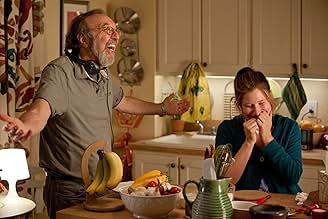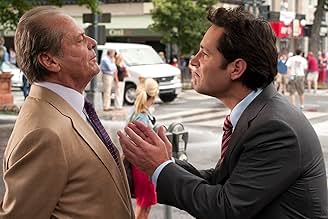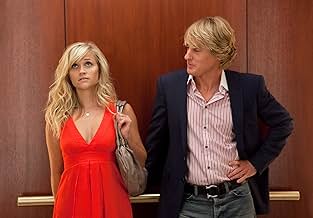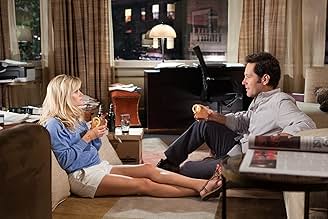IMDb-BEWERTUNG
5,4/10
56.453
IHRE BEWERTUNG
Nachdem Lisa vom US-amerikanischen Softballteam ausgeschlossen wurde, findet sie sich in einer Dreiecksbeziehung wieder, als ein Geschäftsmann und ein Baseballspieler um sie konkurrieren.Nachdem Lisa vom US-amerikanischen Softballteam ausgeschlossen wurde, findet sie sich in einer Dreiecksbeziehung wieder, als ein Geschäftsmann und ein Baseballspieler um sie konkurrieren.Nachdem Lisa vom US-amerikanischen Softballteam ausgeschlossen wurde, findet sie sich in einer Dreiecksbeziehung wieder, als ein Geschäftsmann und ein Baseballspieler um sie konkurrieren.
- Auszeichnungen
- 3 Nominierungen insgesamt
Empfohlene Bewertungen
It's almost unfathomable that this movie stinks...but it does, sadly. Confused characters bumbling through scenes, awful development of backstory, no chemistry, hardly any laughs and just a mishmash of WTF-ery :(
I'm currently watching this film and honestly, it's so bizarre. These are all incredible actors but in this film... I just don't know what is happening. However, I cannot stop watching it. I just need to understand what the hell is going on and what the aim is. The dialogue between characters are all over the place, not sure if it's supposed to be humourous or not either way I'm not laughing but then again... I am because it's such a ridiculous film lol. Even this review sounds so scrambled because of what this film is doing lol.
Some filmmakers you just fall into. The ones I hold most dear are those that are both expert cinematic storytellers and attempt to reshape me. These are rare, but there is a second tier of cinematic storytellers; although they do not work at deep levels, you just get captured by the mastery of the storytelling. Brooks is one of these. He is a master and even his disaster in 1994 was interesting.
This film did poorly in the US. I think it was not zany enough, short enough or abstracted from reality enough for the audience who is attracted to the form. Perhaps if it is judged as mere candy, it fails. But I found it well met the requirements on which the genre was founded: the alternating of charm in the nature of humans with humor about many of the same traits. This engagement-detachment by humor is perhaps the oldest storytelling device after the technique of omission, and Brooks is delicate if old-fashioned.
The story is that he is valued in the business for adding texture of these two qualities: humor and endearment. But he gets stuck in creating scenes that are no longer than a few minutes, because that is what the market pulls. He gets paid extremely well for guiding "The Simpsons," basically two jokes per show, and also as uncredited script doctor on a scene by scene basis. He hates this, he has said and when he can find the space for a long form project, he does it as if his soul is in the balance.
He doesn't start with characters weaving a story, or even a story proper. He is all about situations and how people react within them as they try to gain control. Our two main characters here, destined for love, are struggling less with the lives they are given than the techniques they had been using until that point to cope. The weapons in forming the new situations we desire then to get, are words. And such words in dialog that is so perfect we don't deserve the simply by paying 8 bucks.
Brooks is a writer, but it is clear that every line is written within a specific cinematic vision. Some of the shots here are quite unconventional, the composition and rhythm of shots is very personal and the flow of the words absolutely matches or is counterpointed to that rhythm. Watch the motions of the camera and the dialog when Lisa is first in George's apartment. This is effective and idiosyncratic to Brooks. It worked for me because these films are all about deferred gratification and he is serious about pushing it.
In little things, it works. Witherspoon's lack of sex appeal is handled by making her a tough jock. The formula demands — absolutely demands — that the guy profess his love at the end in front of an audience representing us. We know he is going to her birthday party to do just this, but he does not. Instead Brooks has placed a clever scene before this, a radically unconventional one that works when paired with what happens after the party, observed by no one but us and Nicholsen's character. In this scene — possibly the first written — has the two to-be lovers filming an awkward proposal, and then engaging in a re-enactment in a folded engagement. It satisfies the formula without following it.
There are several folds along these lines, highly structured and effective.
Ted's Evaluation -- 3 of 3: Worth watching.
This film did poorly in the US. I think it was not zany enough, short enough or abstracted from reality enough for the audience who is attracted to the form. Perhaps if it is judged as mere candy, it fails. But I found it well met the requirements on which the genre was founded: the alternating of charm in the nature of humans with humor about many of the same traits. This engagement-detachment by humor is perhaps the oldest storytelling device after the technique of omission, and Brooks is delicate if old-fashioned.
The story is that he is valued in the business for adding texture of these two qualities: humor and endearment. But he gets stuck in creating scenes that are no longer than a few minutes, because that is what the market pulls. He gets paid extremely well for guiding "The Simpsons," basically two jokes per show, and also as uncredited script doctor on a scene by scene basis. He hates this, he has said and when he can find the space for a long form project, he does it as if his soul is in the balance.
He doesn't start with characters weaving a story, or even a story proper. He is all about situations and how people react within them as they try to gain control. Our two main characters here, destined for love, are struggling less with the lives they are given than the techniques they had been using until that point to cope. The weapons in forming the new situations we desire then to get, are words. And such words in dialog that is so perfect we don't deserve the simply by paying 8 bucks.
Brooks is a writer, but it is clear that every line is written within a specific cinematic vision. Some of the shots here are quite unconventional, the composition and rhythm of shots is very personal and the flow of the words absolutely matches or is counterpointed to that rhythm. Watch the motions of the camera and the dialog when Lisa is first in George's apartment. This is effective and idiosyncratic to Brooks. It worked for me because these films are all about deferred gratification and he is serious about pushing it.
In little things, it works. Witherspoon's lack of sex appeal is handled by making her a tough jock. The formula demands — absolutely demands — that the guy profess his love at the end in front of an audience representing us. We know he is going to her birthday party to do just this, but he does not. Instead Brooks has placed a clever scene before this, a radically unconventional one that works when paired with what happens after the party, observed by no one but us and Nicholsen's character. In this scene — possibly the first written — has the two to-be lovers filming an awkward proposal, and then engaging in a re-enactment in a folded engagement. It satisfies the formula without following it.
There are several folds along these lines, highly structured and effective.
Ted's Evaluation -- 3 of 3: Worth watching.
This film has an all-star cast... and not much else. The story meanders around and never really goes anywhere interesting. This was particularly disappointing coming from the writer/director behind As Good as It Gets, one of the best romantic comedies of the past few decades. This film cost a shocking $120 million and made very little at the box office, hence becoming one of the biggest bombs of all time. I only checked it out because it was getting popular on Netflix, I somewhat regret my decision. Just as Jack Nicholson likely regrets having this, as of 2020, be his final film.
I can't believe the low rating of this movie. I guess it's because it does not give you usual polished Hollywood story of romance: boy meets girl, girl has a boyfriend/fiancé who at first seems perfect but then turns out to be douche bag and/or evil and there steps in this new perfect guy, they kiss and live happily ever after, the end.
Here, both guys trying to get the girl are screwed up in some way or another. Boyfriend (Owen Wilson) is not a bad guy. He is not too sensitive, he sleeps around, but the point is he doesn't try to hide it. He is honest about himself. And throughout the relationship he tries to better himself and the relationship with his girlfriend (Reese Witherspoon). On the other hand the "new guy" (Paul Rudd) is depressed, has no job or money and is facing prison time. And at the beginning the girl he's chasing considers him weird. His slime-ball/businessman father (Jack Nicholson) I think just adds likability to Rudds character.
Also, what I like is there is no perfect ending. There is sort of a feel-good ending but it's not perfect. Although, for that you'll have to see the movie.
Here, both guys trying to get the girl are screwed up in some way or another. Boyfriend (Owen Wilson) is not a bad guy. He is not too sensitive, he sleeps around, but the point is he doesn't try to hide it. He is honest about himself. And throughout the relationship he tries to better himself and the relationship with his girlfriend (Reese Witherspoon). On the other hand the "new guy" (Paul Rudd) is depressed, has no job or money and is facing prison time. And at the beginning the girl he's chasing considers him weird. His slime-ball/businessman father (Jack Nicholson) I think just adds likability to Rudds character.
Also, what I like is there is no perfect ending. There is sort of a feel-good ending but it's not perfect. Although, for that you'll have to see the movie.
Wusstest du schon
- WissenswertesOne of the lesser known "big box-office bombs of all time"; the budget spiraled up to $120 million due to high salary demands of its principal cast and director (around $50 million), a lengthy production, as well as a costly re-shoot for the beginning and the ending. Coupled with marketing costs, the movie lost an estimated $105 million.
- PatzerAfter their first night together, Lisa is seen wearing a red camisole that has straps showing after putting on her red dress from the night before. The straps didn't show during their date and after she got home.
- VerbindungenFeatured in The Tonight Show with Jay Leno: Folge #19.58 (2010)
- SoundtracksWhat Is It This Time?
Written by Jamie Lidell (as Jamie Lidderdale) and Mocky (as Dominic Salole)
Performed by Jamie Lidell
Courtesy of Warp Records
By Arrangement with Zync Music
Top-Auswahl
Melde dich zum Bewerten an und greife auf die Watchlist für personalisierte Empfehlungen zu.
- How long is How Do You Know?Powered by Alexa
- What does the title mean?
Details
- Erscheinungsdatum
- Herkunftsland
- Offizieller Standort
- Sprache
- Auch bekannt als
- ¿Cómo saber si es amor?
- Drehorte
- Produktionsfirmen
- Weitere beteiligte Unternehmen bei IMDbPro anzeigen
Box Office
- Budget
- 120.000.000 $ (geschätzt)
- Bruttoertrag in den USA und Kanada
- 30.212.620 $
- Eröffnungswochenende in den USA und in Kanada
- 7.484.696 $
- 19. Dez. 2010
- Weltweiter Bruttoertrag
- 48.668.907 $
- Laufzeit2 Stunden 1 Minute
- Farbe
- Sound-Mix
- Seitenverhältnis
- 1.85 : 1
Zu dieser Seite beitragen
Bearbeitung vorschlagen oder fehlenden Inhalt hinzufügen

Oberste Lücke
What is the Japanese language plot outline for Woher weißt du, dass es Liebe ist? (2010)?
Antwort









































